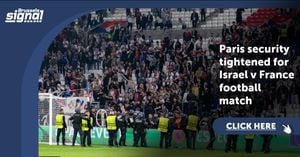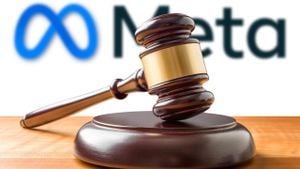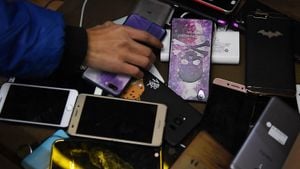Hong Kong has recently witnessed significant judicial actions concerning individuals involved in the pro-democracy protests of 2019. A high-profile case saw the sentencing of Ng Chi-hung, who was handed 23 years and 10 months behind bars for conspiring to attack police officers with explosives during these unrests. This landmark ruling, emphasizing the government's tough stance on dissent, marked the first use of the United Nations Anti-Terrorism Ordinance within the region since its inception.
Ng was charged under the UN ordinance, which was established after the September 11 attacks with the aim of combating terrorism more effectively. Justice Judianna Barnes, presiding over the case, described Ng's planned actions as "a declaration of war on society," reflecting the severity with which the court viewed the threats posed during the protests.
Notably, Ng was not alone; his associate Wong Chun-keung, who led the so-called 'Dragon Slayers,' received 13 years and six months for his involvement. The group's plans included setting off explosives and targeting law enforcement during one of the protests, where tensions between the public and police were already running high.
This level of sentencing is indicative of the broader legal crackdown initiated by Beijing against perceived threats to national security. Steve Li, Chief Superintendent of Hong Kong’s national security department, highlighted the deterrent effect of such sentences, underscoring the government’s commitment to stringent law enforcement. With over 10,000 arrests made since the protests began, these recent decisions have contributed to the feeling of oppression among some citizens and activists.
Since the protests erupted primarily over concerns about the extradition bill — which many saw as a threat to Hong Kong's autonomy — the government has implemented extensive measures to control dissent. This crackdown has drawn criticism from various international observers and human rights organizations, who claim it undermines the freedoms promised to Hong Kong under the “one country, two systems” framework.
The use of the UN Anti-Terrorism Ordinance is significant as it gives authorities more power to enact severe penalties for those involved in activities deemed as terrorism. Critics argue this statute's application to protesters escalates the already heightened tensions between the government and the public. According to the prosecutions, the defendants represented factions within the pro-democracy movement, but many of them are not widely known public figures, bringing to light the reach of the law’s influence.
During the sentencing, Justice Barnes also noted the physical evidence seized during the investigations, including firearms, which factored heavily against the convicted individuals. This reinforces the narrative of the Hong Kong government about the necessity of security measures amid fears of unrest similar to those of 2019. Nonetheless, the public remains divided, with many questioning whether these harsh rulings serve justice or merely suppress voices of dissent.
Despite the significant prison terms handed down, civil society and labor groups continue to advocate for democratic reforms and express their grievances through various means. The push for change within Hong Kong’s political structure persists, even as state mechanisms grow increasingly domineering.
The Hong Kong protests stand as pivotal moments of resistance against the tightening grip of the Chinese administration. Activists and ordinary citizens alike have put their lives on hold, often at great personal risk, to demand greater freedoms and agency over their governance. This battle continues to shape the region's political dynamics as public sentiment grapples with the demands of democracy against the backdrop of stringent legal measures.
Looking forward, the situation remains tense, with observers eagerly watching for any shifts within both the local populace and the response of the governing authorities. The interpretation and application of laws like the UN Anti-Terrorism Ordinance will likely prove central to future events, impacting not just those directly involved but the broader civil society still striving for the preservation of their rights.
The long shadow of the 2019 protests nourishes hopes for change but also breeds fear of retaliation. Activists continue to express concern over the potential expansion of state power and the likelihood of increased prosecutions under similar statutes. Hong Kong appears to stand at a crossroads, as it treads between the weight of oppression and the aspirations for liberty.



